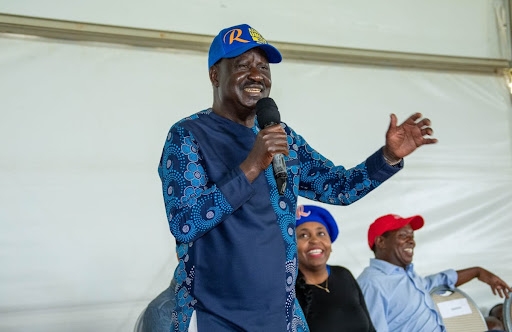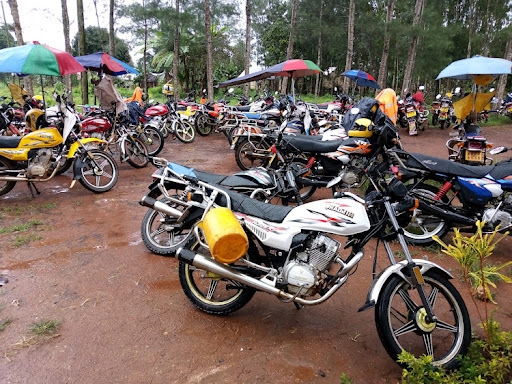This week has been quite dramatic with the arrest of Kiharu MP Ndindi Nyoro, after a commotion in Gitui Catholic church in Murang’a.
Nyoro was invited to greet the congregation and as the host MP, he took the chance to also introduce other colleague MPs who had accompanied nominated MP Maina Kamanda as the chief guest for the fundraiser.
Kamanda had the expectation that it was his prerogative as the senior-most and eldest politician present to do so. A commotion ensued, and police were called in only to take sides. Outside the church, Kamanda and Nyoro addressed the press, only for two policemen to attempt to arrest Nyoro. However, the people of Kiharu protected him and was whisked away.
There was an attempt to equally arrest Kamanda. It is curious to note that there is a very huge age difference between the two, with Kamanda being over 65 years. He is a former councilor, who served in Parliament for over 20 years, a period in which he also became an assistant minister and minister respectively. He has also chaired parliamentary committees.
Nyoro, on the other hand, is a young man, barely in his 30s, who ventured into business successfully soon after finishing college and is serving his first term. Kamanda is practically a father to Nyoro.
A similar incident also happened in Nyeri county where Nyeri Town MP Ngunjiri Wambugu disrupted a meeting hosted by Agriculture CS Mwangi Kiunjuri and Nyeri woman rep Rahab Mukami in the presence of the police, yet no arrests were made.
Fair enough, this is clearly a political contest of the Jubilee factions — Tangatanga and Kieleweke. The political juggernaut that was cobbled out of 14 disparate parties, in the run-up to the 2017 General Elections, secured nearly two-thirds majority seats in the National Assembly with over 267 MPs out of 349 and 38 senators out of 67. It controls 31 counties out of 47 and its presidential candidate, Uhuru Kenyatta, won the two general elections as well as the repeat poll as ordered by the Supreme Court.
However, the handshake of March 9, 2018, that ushered in the cooperation of erstwhile political nemesis Raila Odinga into government has occasioned a shift of the political divide from opposition versus government, to within the Jubilee Party itself.
This is essentially because of the fact that politics are polemic and thus polarising in nature. The succession contestations for 2022 have fully come into play within this arrangement.
The two camps, whose existence I confirmed last year on July 7 on a TV breakfast show, when nobody wanted to speak about it, have gone full-throttle at each other replete with women leagues, one named Team Embrace for Kieleweke and Inua Mama for Tangatanga.
The Jubilee bedroom has since been fully invaded by ODM and Nasa members. It is now common to see Kirinyaga Governor Anne Waiguru in the company of Homa Bay Woman Rep Gladys Wanga in Kisumu than Gladys Shollei (Uasin Gishu) and Gathoni wa Muchomba in Kiambu.
There are two elements that stand out.
One, the church has provided the arena for political contestations due to the captive audience, and hunger for Harambee money by the clergy, notwithstanding the sources.
While it’s Tangatanga that started this strategy, Kieleweke followed suit, despite President Uhuru Kenyatta warning against politicking at the expense of development.
Second is the use of police force and the county administration, previously provincial administration. These two state organs are symbolic of the state itself and they represent the “government” at the grassroots. It is, therefore, significant they have been deployed more in favour of Kielweke than Tangatanga.
This leads to the bigger question, if the police and by extension the courts are used to settle political contestations, if there is selective arrest and use of state power to show political might, if, in the eyes of the people, fairness and justice are seen to be applied unevenly, then what’s purpose of the state apparatus?
It helps in advancing the narrative that there is misuse and abuse of office by custodians of state machinery to achieve a desired political outcome. One can argue that for every political contest, there is a winner and a loser. However, our county’s history is replete with examples of how President Daniel Moi’s totalitarian regime deployed the same measures, yet this made the opposition more popular, leading to its very own ouster.
When Nyoro was finally arrested by a contingent of police officers — and no charges were preferred against him — it served to cast a negative light on the part of the state, while increasing political mileage, visibility and popularity of the ‘victim’.
Democracy only seems to work if the same rules are applied evenly. There is no way this can be achieved without the rule of law. In addition, the sole purpose of the state is to administer certain guarantees to all citizens equally, despite their political persuasion.
There are better ways to settles political contestations and win public support at the same time.
The writer is a senator representing persons with disabilities.











